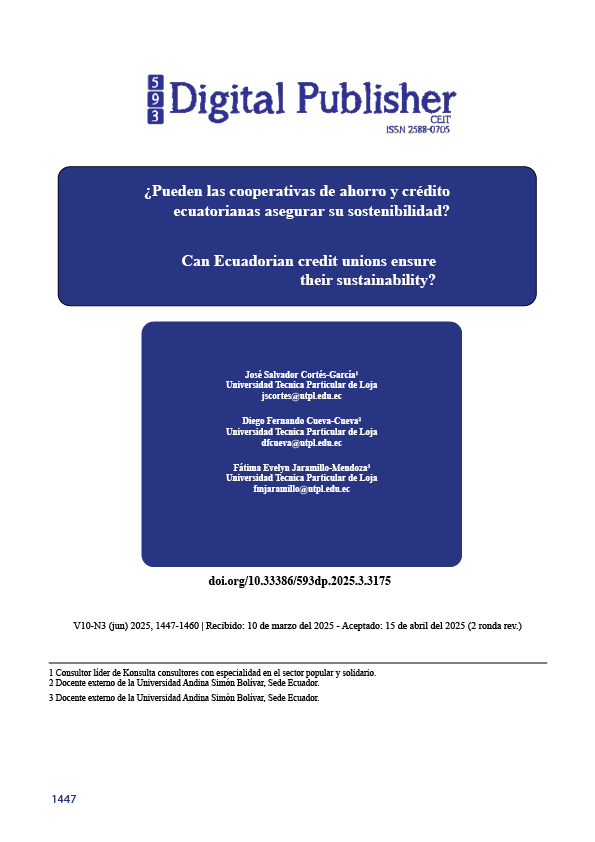Can Ecuadorian credit unions ensure their sustainability?
Main Article Content
Abstract
The objective of this study is to analyze the relationship between value, profitability, and risk of segment 1 credit cooperatives in Ecuador during the period 2017 to 2024. The methodology employs a quantitative approach based on financial data obtained from the Superintendence of Popular and Solidarity Economy of Ecuador. Econometric models, including linear regression and collinearity analysis (VIF), were applied to measure the impact of variables such as return on investment (ROIC), weighted average cost of capital (WACC), indebtedness (END), liquidity (LIQ) and asset size (LNACT) on the creation of economic value added (EVA). The results show that ROIC is the main determinant of EVA, while CCPP and END negatively affect value generation. Liquidity has no significant impact, and asset size is positively associated with value creation. The implications of the study suggest that COACS management should prioritize strategies to maximize profitability (ROIC) based on revenue diversification and operating efficiency, reducing administrative expenses and credit risks. Optimizing the financing structure would decrease the CCPP and the negative impact on value creation (EVA).
Downloads
Article Details

This work is licensed under a Creative Commons Attribution-NonCommercial-ShareAlike 4.0 International License.
1. Derechos de autor
Las obras que se publican en 593 Digital Publisher CEIT están sujetas a los siguientes términos:
1.1. 593 Digital Publisher CEIT, conserva los derechos patrimoniales (copyright) de las obras publicadas, favorece y permite la reutilización de las mismas bajo la licencia Licencia Creative Commons 4.0 de Reconocimiento-NoComercial-CompartirIgual 4.0, por lo cual se pueden copiar, usar, difundir, transmitir y exponer públicamente, siempre que:
1.1.a. Se cite la autoría y fuente original de su publicación (revista, editorial, URL).
1.1.b. No se usen para fines comerciales u onerosos.
1.1.c. Se mencione la existencia y especificaciones de esta licencia de uso.
References
Álvarez-Gamboa, J., Cabrera-Barona, P., & Jácome-Estrella, H. (2023). Territorial inequalities in financial inclusion: A comparative study between private banks and credit unions. Socio-Economic Planning Sciences, 87, 101561.
Anderson, R. G., & Liu, Y. (2013). Banks and credit unions: competition not going away. The Regional Economist, (Apr).
Baselga-Pascual, L., Trujillo-Ponce, A., and Cardone-Riportella, C. (2015). Factors influencing bank risk in Europe: Evidence from the financial crisis. The North American Journal of Economics and Finance, 34, 138-166.
Carrera-Silva, K., Rodríguez Ulcuango, O. M., Abdo-Peralta, P., Castelo Salazar, Á. G., Samaniego Erazo, C. A., & Haro Ávalos, D. (2024). Beyond the Financial Horizon: A Critical Review of Social Responsibility in Latin American Credit Unions. Sustainability, 16(18), 7908.
Cull, R., Ehrbeck, T., and Holle, N. (2014). La inclusión financiera y el desarrollo: Pruebas recientes de su impacto. Enfoques, 92(1).
Fiordelisi, F., Marques-Ibanez, D., and Molyneux, P. (2011). Efficiency and risk in European banking. Journal of banking & finance, 35(5), 1315-1326.
Fiordelisi, F. and Mare, D. S. (2014). Competition and financial stability in European cooperative banks. Journal of international money and finance, 45, 1-16.
Fontela, J. L. M. (2017). Las relaciones entre los valores y principios cooperativos y los principios de la normativa cooperativa. REVESCO. Revista de Estudios Cooperativos, (124), 114-127.
Gambetta, N., García-Benau, M. A., and Zorio-Grima, A. (2019). Stress test impact and bank risk profile: Evidence from macro stress testing in Europe. International Review of Economics & Finance, 61, 347-354.
Gemar, P., Gemar, G., & Guzman-Parra, V. (2019). Modeling the sustainability of bank profitability using partial least squares. Sustainability, 11(18), 4950.
Hesse, H. and Cihak, M. (2007). Cooperative Banks and Financial Stability. SSRN Electronic Journal.
Loaiza, V. E., Tenesaca, E. E. S., and Namicela, A. S. (2019). Microcrédito y dimensiones de capital social en Ecuador. 593 Digital Publisher CEIT, 4(5), 49-57.
Louzis, D. P., Vouldis, A. T., and Metaxas, V. L. (2012). Macroeconomic and bank-specific determinants of non-performing loans in Greece: A comparative study of mortgage, business and consumer loan portfolios. Journal of banking & finance, 36(4), 1012-1027.
Mohanty, S. K. (2006). Comparing credit unions with commercial banks: Implications for public policy. Academy of Banking Studies Journal, 5(1/2), 97.
Segovia‐Vargas, M. J., Miranda‐García, I. M., and Oquendo‐Torres, F. A. (2023). Sustainable finance: The role of savings and credit cooperatives in Ecuador. Annals of Public and Cooperative Economics, 94(3), 951-980.
Walter, J. R. (2006). Not your father’s credit union. FRB Richmond Economic Quarterly, 92(4), 353-377.
Wydick, B., Hayes, H. K., and Kempf, S. H. (2011). Social networks, neighborhood effects, and credit access: evidence from rural Guatemala. World Development, 39(6), 974-982.




